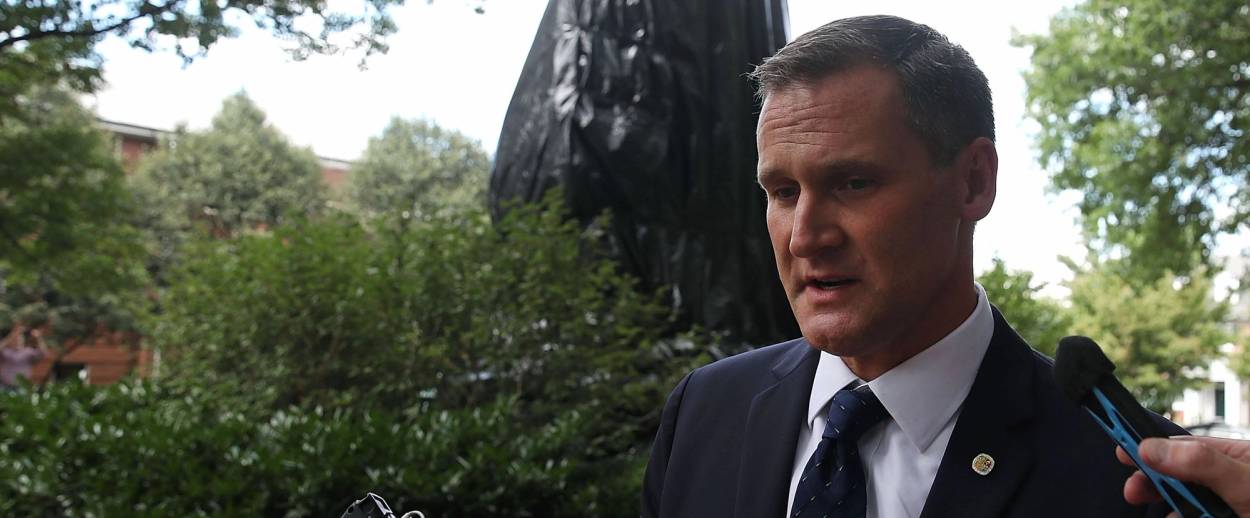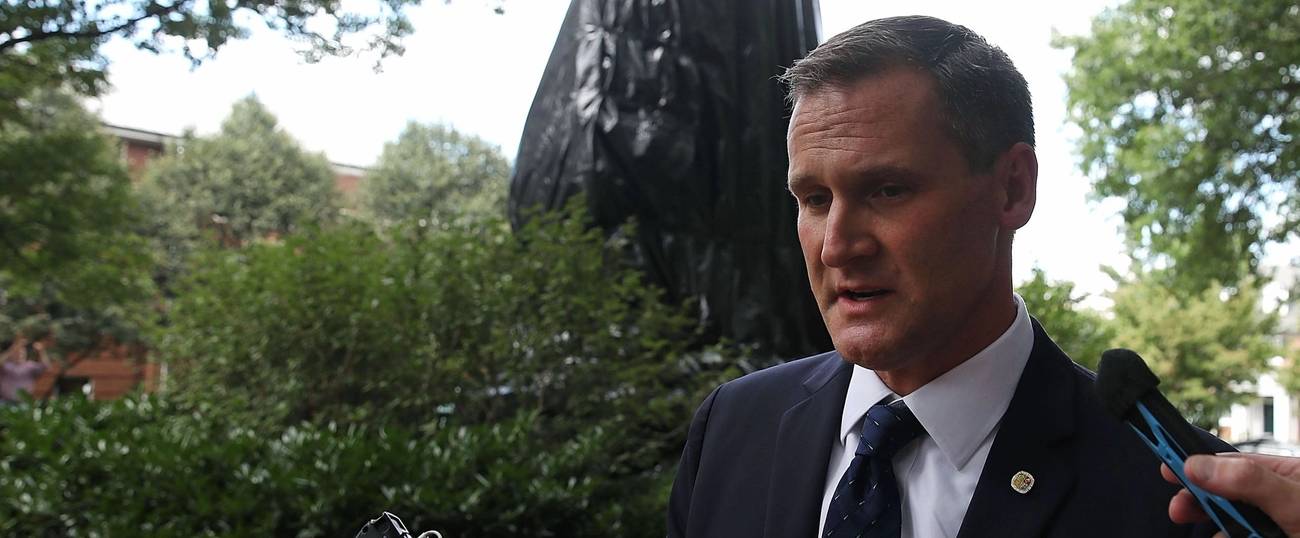Charlottesville Mayor Mike Signer Ran Away From His Jewish Identity For Years. Then He Reclaimed It And Faced Down Nazis.
‘I had not been comfortable publicly being Jewish really for most of my life, and all of a sudden I was.’




Though it looms large in the popular imagination as the gateway to Thomas Jefferson’s Monticello and the University of Virginia, the city of Charlottesville is actually relatively small. Its population is just 50,000 and its mayor is not even directly elected, but rather chosen by the city council from among its members. That’s how Mike Signer became the mayor of Charlottesville in January 2016 at his first city council meeting. Needless to say, he never expected to be facing down neo-Nazis in his own backyard a year later.
The 45-year-old Signer stands an imposing 6’4, but by his own account, for much of his life he would have been the last person you’d expect to find standing up as a symbol of Jewish resistance. In fact, from an early age, he sought to escape his Jewish identity. “I heard my first anti-Jewish slur when I was seven or eight years old and it made a big impact on me,” he told me in Jerusalem, where we are serving as co-panelists at the Global Forum for Combating Anti-Semitism. As a result of this and other negative experiences, he said, “I became an assimilationist and somewhat self-denying for the majority of my young adult life.”
That all began to change, however, when Signer visited Israel, first in 2008 and then in 2013 with his wife, Dr. Emily Blout. Recently married and preparing to start a family, Signer was “doing a lot more reflection and a lot more learning about Judaism.” The 2013 trip coincided with the 65th anniversary of the state of Israel. “Thinking about Zionism and thinking about what the creation of the state did, the function of the state for this people, it kind of came together just at the right time,” Signer recalled. Israel showed him a model of Jewish self-confidence that he could embrace. “I had not been comfortable publicly being Jewish really for most of my life,” he said, “and all of a sudden I was.”
This newfound comfort in his identity would serve Signer well when he and his city came under vicious anti-Jewish assault. “I needed that and it gave me a lot of strength to draw from in becoming a public face of a city where anti-Semitism was deployed against me and so many other people,” he said. “There was a confidence and a strength and an identity and a mission that I could connect with very strongly.”
Signer made headlines throughout the Charlottesville crisis with his forthright denouncements of the white supremacists invading his town and his humorous trolling of them on social media. (He received hundreds of threats during those months, ranging from threatening social media postings to phone messages with recordings of Adolf Hitler.) Signer’s sentiments were not new, but simply in keeping with his tenure as mayor, where he spent much of his time working on racial reconciliation. One of his first initiatives as mayor was a blue ribbon commission on race, memorials, and public spaces that sought to address the wounds of racism still prevalent in the public square—and it was these efforts that ultimately drew white supremacist protesters to Charlottesville.
Among several national Jewish organizations, Signer credits the Anti-Defamation League in particular for its help throughout the entire affair. Though Charlottesville made national headlines when extremists descended on it for the “Unite the Right” rally in August, the white supremacists had in fact already been staking out the place for months. In May 2017, alt-right luminary Richard Spencer held a smaller rally in the city, which Signer powerfully rebuked. While this gathering of a few dozen racists did not receive as much media attention, it did not escape the notice of the ADL, which immediately sprang into action.
“They contacted me within days,” Signer said. “They arranged a call. My wife got on the call. They had several people on it. They said, ‘We’ve opened a file on you, we have hundreds of instances of attacks on you,’ and it was very reassuring to have a group of experts on this, who understood what it is when public officials are attacked and could talk us through it and give us some reassurance and also resources.” They also put Signer in touch with the FBI. “I had not been connected with the FBI before,” he said, “and the agent really helped me think through what is a real threat versus what’s threatening, what are the legal standards, and so on.”
Today, having completed his two-year term as mayor, Signer is transitioning back into private life while addressing audiences on the importance of defending America’s democracy and pluralism against those who would upend them. His defiant posture is a far cry from the schoolboy who sought to shirk his Jewish identity in the face of persecution. Today, his message to young people is just the opposite.
“The worst outcome would be if this trolling generated fear that actually hurt democracy itself and people’s willingness to step into democracy, whether it’s as public servants, activists, journalists, or any other stakeholder or leader,” Signer said. “Unfortunately, I do see that.”
“Fear is what we have to fear, especially when it comes to Jewish people participating in public life, because if there’s a whiff of vulnerability that you’re easily intimidated, that’s blood in the water to these people. But once you take that step and confront it, I don’t think there’s much to be afraid of.”
Yair Rosenberg is a senior writer at Tablet. Subscribe to his newsletter, listen to his music, and follow him on Twitter and Facebook.